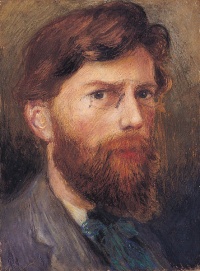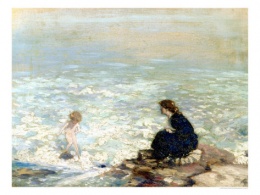George William Russell: Difference between revisions
Pablo Sender (talk | contribs) No edit summary |
No edit summary |
||
| Line 8: | Line 8: | ||
<blockquote>You dismiss H. P. Blavatsky rather too easily as "hocus pocus." Nobody ever affected the thought of so many able men and women by "hocus pocus." The real source of her influence is to be found in [[The Secret Doctrine (book)|''The Secret Doctrine'']], a book on the religions of the world suggesting or disclosing an underlying unity between all great religions. It was a book which Maeterlinck said contained the most grandiose cosmogony in the world, and if you read it merely as a romantic compilation, it is one of the most exciting and stimulating books written for the last hundred years. It is paying a poor compliment to men like [[William Butler Yeats|Yeats]], Maeterlinck, and others, to men like [[William Crookes|Sir William Crookes]], the greatest chemist of modern times, who was a member of her society, to [[Charles Carter Blake|Carter Blake]], F.R.S., the anthropologist, and the scholars and scientists in many countries who read H. P. Blavatsky's books, to assume that they were attracted by "hocus pocus." If you are ever in the National Library, Kildare Street, and have a couple of hours to spare, you might dip into "The Proem" to The Secret Doctrine, and you will understand the secret of the influence of that extraordinary woman on her contemporaries.<ref>William Kirkpatrick Magee, ''A Memoir of AE: George William Russell'', (London:Macmillan & Co., Ltd., 1937), 164-5.</ref></blockquote> | <blockquote>You dismiss H. P. Blavatsky rather too easily as "hocus pocus." Nobody ever affected the thought of so many able men and women by "hocus pocus." The real source of her influence is to be found in [[The Secret Doctrine (book)|''The Secret Doctrine'']], a book on the religions of the world suggesting or disclosing an underlying unity between all great religions. It was a book which Maeterlinck said contained the most grandiose cosmogony in the world, and if you read it merely as a romantic compilation, it is one of the most exciting and stimulating books written for the last hundred years. It is paying a poor compliment to men like [[William Butler Yeats|Yeats]], Maeterlinck, and others, to men like [[William Crookes|Sir William Crookes]], the greatest chemist of modern times, who was a member of her society, to [[Charles Carter Blake|Carter Blake]], F.R.S., the anthropologist, and the scholars and scientists in many countries who read H. P. Blavatsky's books, to assume that they were attracted by "hocus pocus." If you are ever in the National Library, Kildare Street, and have a couple of hours to spare, you might dip into "The Proem" to The Secret Doctrine, and you will understand the secret of the influence of that extraordinary woman on her contemporaries.<ref>William Kirkpatrick Magee, ''A Memoir of AE: George William Russell'', (London:Macmillan & Co., Ltd., 1937), 164-5.</ref></blockquote> | ||
== Russell and Judge == | |||
In a letter to Carrie Rea, Russell wrote of his friend [[William Quan Judge]]: | |||
<blockquote> | |||
I have sent you today... a book which I hope you will like <u>Letters</u> <u>that</u> <u>have</u> <u>helped</u> <u>me</u>. They are written by a man whom I consider the wisest and sweetest of any I have ever met W.Q.Judge (Z.I.Z.). I have more reverence for him than for an other human being I know of. I hope they will mean as much to you as to many of us. They are not badly written; but do not think of fine or beautiful phrases when reading the, but only of the things it is good to live with and ever to keep in mind. I think he says only things he <u>knows</u>.<ref>George W. Russell letter to Carrie Rea. September 6, 1894. Transcriptin the "Judge materials"of Boris de Zirkoff Papers. Records Series 22. Theosophical Society in America Archives.</ref> | |||
</blockquote> | |||
==Online resources== | ==Online resources== | ||
Revision as of 15:46, 29 April 2015

George William Russell (April 10, 1867 – July 17, 1935) was an eminent Irish poet and essayist who wrote with the pseudonym Æ (sometimes written AE or A.E.). He was deeply affected by H. P. Blavatsky's ideas. A month before he died, he wrote in a letter to the Irish author Sean O'Faolein the following:
You dismiss H. P. Blavatsky rather too easily as "hocus pocus." Nobody ever affected the thought of so many able men and women by "hocus pocus." The real source of her influence is to be found in The Secret Doctrine, a book on the religions of the world suggesting or disclosing an underlying unity between all great religions. It was a book which Maeterlinck said contained the most grandiose cosmogony in the world, and if you read it merely as a romantic compilation, it is one of the most exciting and stimulating books written for the last hundred years. It is paying a poor compliment to men like Yeats, Maeterlinck, and others, to men like Sir William Crookes, the greatest chemist of modern times, who was a member of her society, to Carter Blake, F.R.S., the anthropologist, and the scholars and scientists in many countries who read H. P. Blavatsky's books, to assume that they were attracted by "hocus pocus." If you are ever in the National Library, Kildare Street, and have a couple of hours to spare, you might dip into "The Proem" to The Secret Doctrine, and you will understand the secret of the influence of that extraordinary woman on her contemporaries.[1]
Russell and Judge
In a letter to Carrie Rea, Russell wrote of his friend William Quan Judge:
I have sent you today... a book which I hope you will like Letters that have helped me. They are written by a man whom I consider the wisest and sweetest of any I have ever met W.Q.Judge (Z.I.Z.). I have more reverence for him than for an other human being I know of. I hope they will mean as much to you as to many of us. They are not badly written; but do not think of fine or beautiful phrases when reading the, but only of the things it is good to live with and ever to keep in mind. I think he says only things he knows.[2]
Online resources
Articles
- "AE" Poet and Theosophist by Boris de Zirkoff
Additional resources
- In Memoriam - George William Russell articles from the Canadian Theosophist

